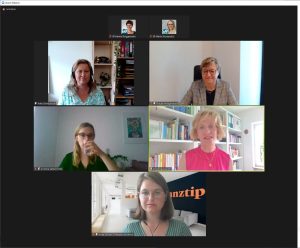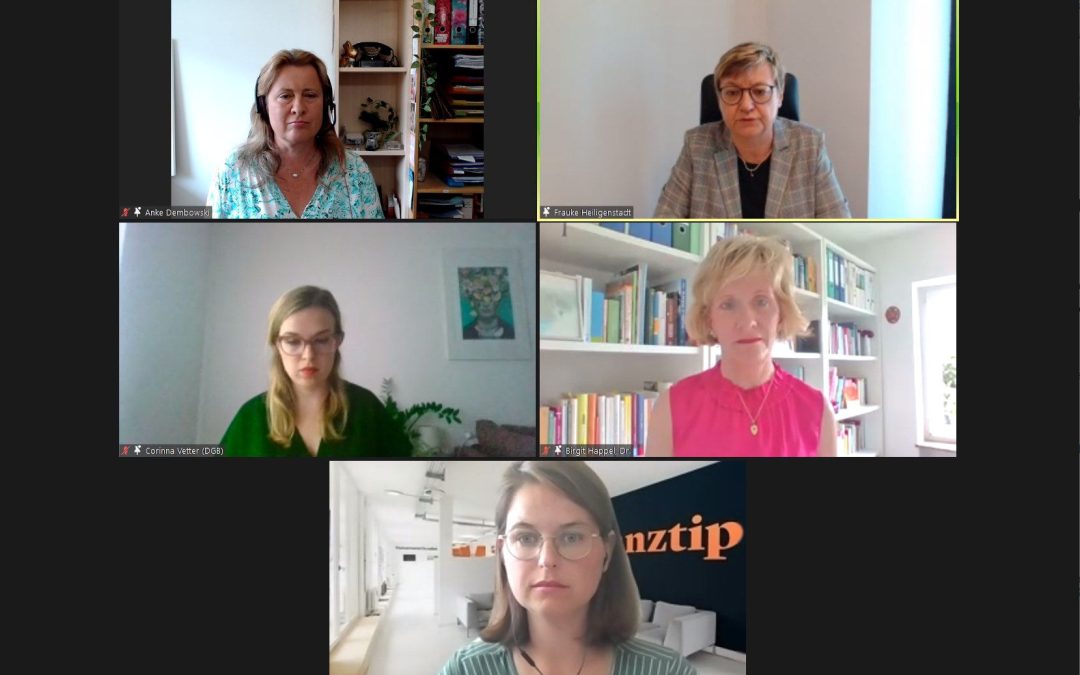On the topic of poverty among women in old age on on June 24 in the, a high-profile Podiumsdiskussion took place. The digital roundtable discussion focused in particular on the role played by financial education and financial services offerings. The event was hosted by the non-profit research institute institut für finanzdienstleistungen e.V. (iff) in Hamburg.
Moderated by Fondsfrau Anke Dembowski, the following panelists discussed the topic:
- Frauke Heiligenstadt: Member of the Bundestag for the SPD and member of the Bundestag Committee on Finance. She has been politically much involved in the issues of finance, equality and education.
- Dr. Birgit Happel: She is a financial education expert and an expert on financial equality. She offers training for multipliers and financial coaching and is a board member of the association "Präventionsnetzwerk Finanzkompetenz (PNFK)", which works to strengthen financial education and improve the political framework for less privileged groups.
- Anika GörnerShe is a podcaster and encourages female consumers in particular to tackle their own finances in her Finanztip podcast "auf Geldreise". Finanztip is part of the non-profit Finanztip Stiftung.
- Corinna Vetter: She is head of the project "Was verdient die Frau?" This project is anchored at the German Trade Union Confederation DGB in the educational work.
Sad fact: poverty in old age is female
The background to the discussion is as follows: Although female finance is currently a big buzzword, women still have significantly less money at their disposal in old age than men.
For example, the average amount of the statutory old-age pension that women received for their own pension insurance contributions in 2020 was €730 in the old federal states and €1,075 in the new federal states. Men, on the other hand, received an average old-age pension of €1,210 in the old states and €1,200 in the new states in 2020.
Of course, this discrepancy does not come about by chance. Women pay in less and therefore get out less. This is not only the case in the statutory pension scheme, but also in the company pension scheme, as well as in the private pension scheme.
Women are well aware of the problem
It's not that women don't know that. This year's Jugendstudie der MetallRente shows that three quarters of 17- to 27-year-olds are worried about receiving only a low pension in old age and being poor. It is striking that the fear of old-age poverty is even more present among young women (84%) than among young men. So although women know about this and are afraid of old-age poverty, they do not do enough about it. The MetallRente study shows, for example, that only 29% of young women regularly save for their old age. By contrast, 45% of young men regularly put money aside for their retirement.
The panel discussion focused on the factors that cause old-age poverty to be predominantly female and how old-age poverty, specifically female poverty, can be countered.
The discussion yielded the following insights / suggestions:
Expand financial knowledge among the population
- A lack of financial knowledge and then too little confidence in one's own knowledge is one of the reasons why women more often end up with too low a pension. Measures must be taken to promote financial knowledge across the board. More financial knowledge should be taught in schools in particular, without there necessarily having to be a "finance" subject. The topic could be addressed much more in subjects such as mathematics, social studies and other subjects.
- Women who are no longer of school age should also be offered financial education (e.g. promotion of financial coaching by independent bodies). The line between freedom of choice on the one hand and a kind of compulsory financial driving license on the other was discussed.
- There was criticism that the changes brought about by the new divorce law were not communicated enough, so that many women are not aware that they cannot rely on a long marriage as a retirement provision.
Eliminate structural barriers
- There are some structural barriers that prevent women from pursuing full-time earning capacity. These include spousal splitting, free co-insurance for spouses, and also the 450 euro jobs that do not build up their own retirement provision.
- Even if these things are well-intentioned and were celebrated as an achievement at the time, they should be abolished in the long term. The reason: they hinder full-time employment for women and thus the build-up of their own pension rights.
Distribute care work more fairly
The reason why more women than men work part-time is considered to be that women take on significantly more care work than men. Hence the following demands:
- Care work must be distributed more equitably, but this represents a major social challenge.
- Frauke Heiligenstadt believes that care work should be subject to social insurance contributions so that everyone who performs these grueling tasks acquires their own pension rights.
- One way to get men on board here is to have clear agreements among (married) partners, especially when family planning is on the agenda.
- Overall, a social rethink should be promoted here in order to change the understanding of the roles of men and women.
The products are okay, but women should be addressed differently
- There was agreement that women do not need special financial offers with a pink coating. Rather, the existing offers were usable for women and men.
- However, the approach for women should be different in order to address more the specific reality of women's lives. In this way, they could feel better understood and addressed.
Women should take on more personal responsibility
- Women are aware of the need to build up their own retirement provision, but it seems that many still have a glorified image of marriage ("it's different for me"). For this reason, the aim is to encourage women to take on more personal responsibility and to actively address the issues of finances and retirement provision in their partnership as well.
- A social rethink is also helpful here.
Companies and politics should also do more
- The big break in women's careers often takes place when they start a family, i.e. around 30. It is therefore important to further expand childcare options so that it is also easier for women with young children to continue to pursue paid employment.
- The path back into the job after a family break should be facilitated and promoted, both by companies and by politics.
- To support young families, companies should increase work flexibility. Helpful measures here include home office, no meetings after 4 p.m., flexible working hours, opportunities for advancement even for part-time employees, etc.
The positive experience companies gained during the Corona crisis and the acute shortage of skilled workers should increase companies' willingness to allow more flexibility.




